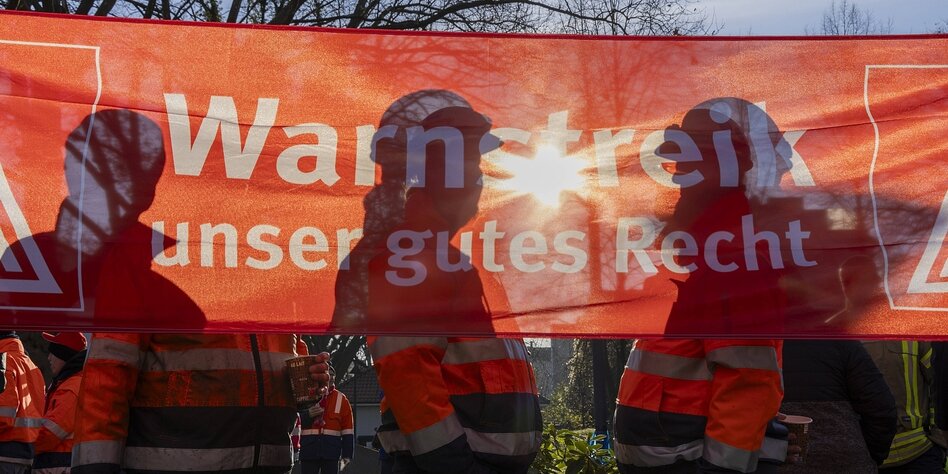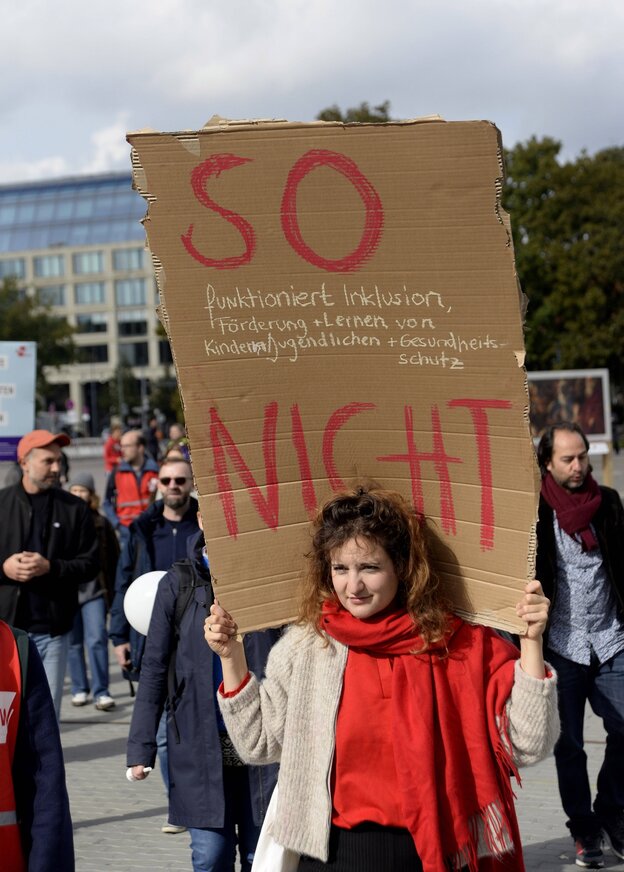
Boiler pressure: warning strike in the steel industry, Dortmund, December 2023 Photo: Markus Matzel/imago
Union labor disputes are becoming more certain under the pressure of the economic situation. The debate on the right to strike will be crucial.
YouThe German Trade Union Federation (DGB) is calling its May Day demonstrations this year under the motto “More wages, more free time, more security.” Given the greater number of members, the umbrella organization feels the wind in its favor. “We, the unions, make sure that people do not have to feel exposed to the many upheavals of our time,” he confidently states in his call for May 1. At the same time, the DGB warns against restrictions on the right to strike.
The unions organized in the DGB gained 437,000 new members in 2023, an impressive figure. These are many more people than actually belong to the CDU or the SPD. Membership of both is now below 370,000. However, the net increase is significantly weaker. Losses due to resignation or death are also enormous. The DGB unions only have a total of just under 22,000 more members than in 2022. Which, however, is a great success.
Unlike previous times, joining a union is no longer a life decision for many salaried employees. Verdi president Frank Werneke speaks of a trend toward “hop-on-hop-off” membership. This means that they enter when they specifically expect something from it, but also leave soon when what they expected has been achieved or their hopes are disappointed.
Therefore, it seems premature to talk about a change in trend. Since a peak in 1991, when 11.8 million people were unionized, the membership curve has only steadily declined in recent decades. One product of this weakening of unions is the sharp decline in collective bargaining among employees. In 2000, 68 percent nationwide could still count on the rights stipulated in collective agreements; in 2023, only 49 percent. More and more employers are evading their social responsibility and no longer negotiate with unions on the basis of social collaboration.

Too few staff for too many children: teachers go on strike in Berlin, 2022 Photo: Bernd Friedel/imago
Where there is no collective agreement, unions cannot fight for a better one. This is one of the reasons why working conditions in companies that are not subject to collective agreements are generally significantly worse in key respects. The usual weekly working day there, of 39.5 hours, is on average almost an hour longer than in companies with a collective agreement (38.6 hours).
The DGB unions gained 437,000 members in 2023, more than the CDU or the SPD have members
There is also a wage gap of several hundred euros. She hopes that “politics will finally guarantee better and broader collective bargaining,” says DGB president Yasmin Fahimi, reminding the traffic light parties of their coalition agreement, but at the same time admitting her own weakness.
The need to fight
On the one hand, the dramatic increase in the cost of living following the outbreak of the Ukrainian war has made many employees more aware of the need to fight for higher wages and better working conditions. On the other hand, this was and is linked to the expectation that unions are also willing to become more combative again. The result was a series of collective bargaining negotiations last year and this year that became more contentious again, and not only in the transport sector, although strikes and warning strikes at Deutsche Bahn, in local public transport and at airports They were the most sensational. .
Unlike the spectacular strike of the German Machinists' Union (GDL), organized in the Civil Service Association, wage demands were and are the focus of most of the current collective disputes for the 35-hour week. Almost everywhere it has been possible to avoid the threat of real wage losses.

Icon Klaus Weselsky: participant in the GdL strike, Dortmund, 2024 Photo: Markus Matzel/imago
The wage increases being fought for are in the double-digit percentage range in many collective agreements. However, increases are usually distributed in several stages. The terms of the collective agreement are significantly longer than what the unions demand. What they also failed to do was compensate for the real wage losses they had already suffered. But at least they have managed to ensure that, in addition to the percentage salary increases, more than three quarters of all collectively contracted employees also receive a tax-free and social security inflation compensation bonus, which amounts to an average of 2,761 euros.
It is still unclear what IG Metall will demand in the biggest collective bargaining dispute coming this year. The collective agreement for the approximately 3.9 million people employed in this sector nationwide expires in the fall. The first warning attacks could take place here from the end of October.
Too many strikes?
It will be interesting to see if the notable debate over the German right to strike has calmed down again by then. Calls from employers, the union and the FDP to limit the supposedly overly liberal right to strike grew louder this year following the extremely effective strikes by the GDL at Deutsche Bahn and by Verdi at airports and on local public transport . . CDU president Friedrich Merz fantasized about “strike excesses.” And even the Minister of the Green Economy, Robert Habeck, demagogically stated that “there are too many strikes at the moment for less and less work.”
The right to strike, which is already heavily regulated in Germany, is the only real means of pressure that unions have.
But the right to strike, which is already heavily regulated in Germany, is the only real means of pressure that unions have. Otherwise, all they would have left would be “collective begging,” as DGB leader Fahimi claims. That is why the unions want to take to the streets this May 1 to defend their fundamental rights.
The example of the stalled collective bargaining agreement in the retail sector, where there has been no movement since the middle of last year, shows what happens when the enforcement power of unions is not strong enough. Employers are not willing to accept a wage agreement that does not mean a loss of real wages. They simply became stubborn because Verdi repeatedly calls warning strikes, but the union lacks the power to close supermarkets. If your arms are too weak, the wheels will not stop. Unfortunately, this applies to many industries where employees are not organized enough.
Where to go for the May 1 strike? For example there:
Hanover, 11 o'clock. Goseriedeplatz (DGB central May Day demonstration): with the Yasmin Fahimi, president of the DGB.
Berlin, 12:00 p.m. Red Town Hall: with the Katja Karger, President of the Berlin DGB and the Cosima Ingenschay, vice president of EVG.
Bottrop, 11:00Gladbecker Straße: with the Verdi vice president Christine Behle.
Bremen, 12:00 p.m., domshof: with that IG BAU President Robert Feiger.
Dortmund, 12:00 p.m. Party meadow: with the Verdi's vice president, Andrea Kocsis.
Dresden, 10 hours, Golden Rider: with Sylvia Bühler, member of Verdi's federal council and Federal Labor Minister Hubertus Heil (SPD).
Duisburg, 12:00 p.m. Northern Landscape Park: with Jürgen Kerner, second president of IG Metall
Erfurt, 11:00 a.m.EF Anger, with Christiane Benner, first president of IG Metall
Göttingen, 12:00 p.m. Albaniplatz: with that Hans-Jürgen Urban, member of the federal board of directors of IG Metall
Halle/Saale, 12:00 p.m.Market: with Anja Piel, member of the DGB board of directors.
Hamburg, 12:00 p.m. St. Pauli fish market: with the Maike Finnern, president of the GEW.
Koblenz, 11.55 am, Deutsches Eck: with Stefan Körzell, member of the DGB board of directors.
Cologne, 1:00 p.m. Heumarkt: with that Witich Roßmann, President of the Cologne DGB and the The president of the IGBCE, Michael Vassiliadis.
Münster, 12:00 p.m. Stubengasseplatz: with the Elke Hannack, Vice President of the DGB.
Munich, 11:00 am. Marienplatz: with that Frank Werneke, president of Verdi.
Recklinghausen, 3:00 p.m., City garden: with Christine Behle, Vice President of Verdidem Kevin Kühnert, general secretary of the SPD and the Ricarda Lang, leader of the Green Party.
Stadium, 10 am, in the sand: with the European MEP Katarina Barley (SPD).
.
